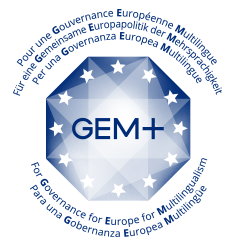- GEM+
- Our objectives
- Programme
Programme of the GEM+ association
For Governance, for Europe, for Multilingualism
1. The political context of the association’s action
Article 3 of the by-laws estabishes that “the association’s goal is the promotion of the multiplicity of the official languages of the European Union in the work and everyday life of the European institutions and their environment with a view to improving European governance, communication and European policies. In this context, its goal is also to prevent the hegemony of any individual language.
The association is not affiliated to any political party.“
This falls within the scope of:
• The political project set out by the European Council at its Barcelona meeting on 15-16 March 2002: “Presidency conclusions (44) – teaching at least two foreign languages from a very early age”;
• The Council Resolution of 21 November 2008 on a European strategy for multilingualism “to improve competitiveness, mobility and employability and as a means to strengthen intercultural dialogue”;
• The Conclusions of the Council of the European Union (Education, Youth, Culture and Sport) of 14 May 2014 in Brussels “on plurilingualism and the development of linguistic competences”;
• The signing of the European Charter of Plurilingualism, as tabled in May 2009 at the second European Conference of Plurilingualism to various European and national bodies.
2. Scope of the association
By Governance, we mean any action, practice or communication stemming from European and national institutions as well as from any Body or entity related to these institutions, such as the media, which participate in the European construction.
By language diversity we mean:
2.1 In Institutions, Bodies and entities of the European Union
a) At the European Parliament
The preservation of full multilingualism at Plenary Sessions as well as for the work of the parliamentary committees and communication with citizens and their information.
Improvement of linguistic plurality for informal working groups and interventions of parliamentarians in consultation meetings (promotion of multilingualism and mutual understanding whenever mediation in the translation of written documentation or oral interpretation is not possible).
The implementation of integral and non-discriminatory multilingualism for the website and the audio-visual presentations of the Parliament.
b) At the European Commission and the European External Action Service (EEAS)
The use, at at a first stage, of the three traditionally most widely spoken languages (English, French and German) also informally called “working languages” – in a balanced way. To this end, it would be desirable that this balanced and equitable use be defined within the framework of a mechanism ensuring its implementation and control. Following the rulings of the EU Court of Justice (ECJ) of September and December 2015 in which the ECJ noted that the European Commission had failed to legally justify the use of the three languages German, English and French with regard to the recruitment procedures established by EPSO, it is advisable to extend this mechanism as quickly as possible to other major European languages such as Spanish and Italian and even Polish.
It would be advisable for all staff members to be able to work as quickly as possible in at least three of these six languages, with the help of native editors or interpreter translators, who could intervene ex post to improve the drafting of the texts.
Depending on the Directorates-General and the themes concerned, the use of other languages should be recommended.
In their representative functions, Commissioners and civil servants should be encouraged to speak also in their mother tongue.
Officials who have a very good knowledge of at least three of the six above-mentioned languages, in addition to their mother tongue, should get a promotion.
c) At the European Council
Full multilingualism at meetings of Heads of State and Government must be preserved.
d) At the EU Council
Broad multilingualism is to be reintroduced in the Council’s Working Groups.
It is recommended that the three working languages of the European Commission be used at COREPER.
Full multilingualism should apply at the level of the official meetings of the ministers of the Member States and multilingualism should apply as widely as possible at their informal meetings.
e) At the Court of Auditors
The use of several working languages should be preserved.
f) At the Court of Justice
Full multilingualism should be kept in the interest of citizens.
2.2 In the advisory bodies of the European Union: the European Economic and Social Committee and the Committee of the Regions
Integral multilingualism should apply as for the European Parliament.
The Committees’ websites should be in more than two languages.
2.3 At EU agencies
At least two working languages of the Commission and one of the official languages of the State in which the agency in question is located should be used.
This objective should be based on a balance between language pairs (for example English-French, German-French, German-English, etc.).
2.4 Within all institutions
a) Communication with European citizens and their information
Multilingualism should apply for the websites of the above-mentioned institutions dedicated to informing citizens.
b) Communication directed towards national, regional and local authorities of the Member States
Multilingualism or at least the use of three working languages of the European Commission should apply for all information material sent to local authorities in the Member States.
c) The media
Invite audio-visual media (notably the European Broadcasting Union) to organise any European political or cultural debate in at least the working languages of the European Commission. This campaign should target journalists and stakeholders alike.
d) Call for tenders
Calls for tenders, calls for applications and competitions and expressions of interest, etc. must be drafted in at least the working languages of the European Commission.
[1] This concept is actually mentioned in Article 15.1 of the Treaty on the Functioning of the EU: “In order to promote good governance and ensure the participation of civil society, the Union’s institutions, bodies, offices and agencies shall conduct their work as openly as possible.” It is also defined in the EU’s official glossary: http://eur-lex.europa.eu/summary/glossary/governance.html?locale=en
